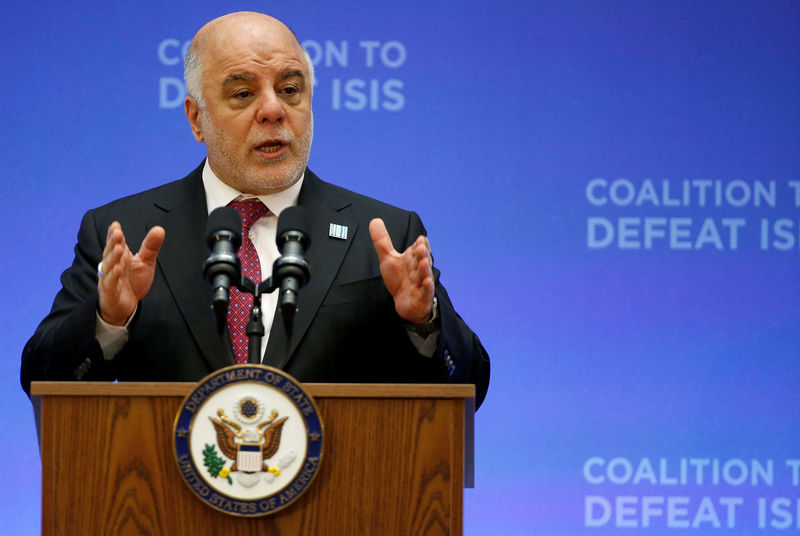By Maher Chmaytelli
BAGHDAD (Reuters) - Iraqi Prime Minister Haider al-Abadi said on Monday he had formally demanded the Kurdistan region suspend an independence referendum that regional neighbours and Western powers fear could undermine a campaign against Islamic State militants.
Turkey, which like Iran harbours fears of Kurdish separatism on its own territory, carried out military exercises at the Iraqi border. Iran warned of unspecified consequences if the Iraqi Kurds went ahead with their plans.
But the Kurdish leadership in northern Iraq showed no sign of flinching despite coming under intense international and regional pressure to call off the Sept. 25 vote.
Kurdish forces have, with U.S. backing, been in the forefront of the battle against Islamic State in Iraq and Syria. But the Kurdish involvement strains relations between Washington and Ankara.
The Iraqi Supreme Federal Court approved Abadi's demand to consider "the breakaway of any region or province from Iraq as unconstitutional", his office said in a statement.
"Holding (the referendum) will lead to dangerous outcomes, resulting in the division of Iraq and threatening civil peace."
The court, in charge of settling disputes between the central government and the provinces, "ordered" the government of the autonomous Kurdish region to stop the referendum.
The court's order bears legal weight but it cannot be implemented in practice in the Kurdish region which has its own police and its own government, led by Massoud Barzani.
Iraqi state TV said the court had issued an "order to stop the procedures of the referendum planned on Sept. 25 (..) by the Kurdistan regional presidency".
The United Nations, the United States, Britain and France have renewed over the past 48 hours their rejection of the vote, seen as a distraction from the war on Islamic State militants who continue to occupy parts of Iraq and Syria.
They called on Erbil, the seat of the Kurdistan Regional Government, to talk with Baghdad to resolve land and power sharing disputes.
TURKISH MANOEUVRES
Iran also demanded restraint from the Iraqi Kurds.
"Any damage to this strategic principle (of Iraq's unity) would lead to the revision of and serious alteration in the existing cooperation between Iran and Iraq’s Kurdistan region,” said Ali Shamkhani, the secretary of Iran's Supreme National Security Council, according to state-run Press TV.
Turkish Prime Minister Binali Yildirim has said the planned Sept. 25 referendum is an issue of national security, and warned that Turkey will take any necessary steps in response.
Around a hundred Turkish military vehicles, mostly tanks, took part in exercises near the Habur border gate, a crossing point into Iraq, the private Dogan news agency said on Monday. Vehicles carrying missiles and howitzers also participated.
Turkey especially has large commercial investments in northern Iraq and long cultivated close relations with Erbil, despite a conflict on its own territory with Kurdish separatists that has run since 1984. Oil is a central issue.
The Kurdish regional government announced on Monday that it had agreed with Russian oil major Rosneft to invest in its gas pipeline infrastructure and to export large supplies of gas to Turkey and Europe.
Kurdistan has been exporting oil independently from the central government in Baghdad since 2014 and Kremlin-controlled Rosneft joined the list of buyers this year, lending the semi-autonomous region hundreds of millions of dollars in loans guaranteed by future oil sales.

"All outstanding issues between the federal Government and the Kurdistan Regional Government should be resolved through structured dialogue and constructive compromise," U.N. spokesman Stephane Dujarric said in a statement on Sunday.